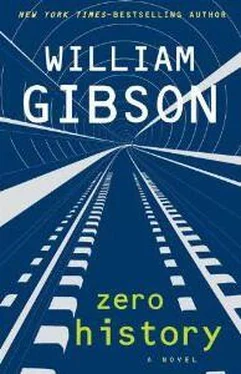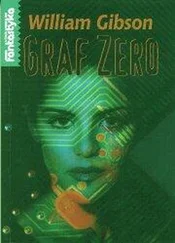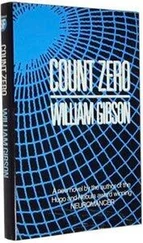William Gibson - Zero history
Здесь есть возможность читать онлайн «William Gibson - Zero history» весь текст электронной книги совершенно бесплатно (целиком полную версию без сокращений). В некоторых случаях можно слушать аудио, скачать через торрент в формате fb2 и присутствует краткое содержание. Жанр: Фантастика и фэнтези, на чешском языке. Описание произведения, (предисловие) а так же отзывы посетителей доступны на портале библиотеки ЛибКат.
- Название:Zero history
- Автор:
- Жанр:
- Год:неизвестен
- ISBN:нет данных
- Рейтинг книги:4 / 5. Голосов: 1
-
Избранное:Добавить в избранное
- Отзывы:
-
Ваша оценка:
- 80
- 1
- 2
- 3
- 4
- 5
Zero history: краткое содержание, описание и аннотация
Предлагаем к чтению аннотацию, описание, краткое содержание или предисловие (зависит от того, что написал сам автор книги «Zero history»). Если вы не нашли необходимую информацию о книге — напишите в комментариях, мы постараемся отыскать её.
Zero history — читать онлайн бесплатно полную книгу (весь текст) целиком
Ниже представлен текст книги, разбитый по страницам. Система сохранения места последней прочитанной страницы, позволяет с удобством читать онлайн бесплатно книгу «Zero history», без необходимости каждый раз заново искать на чём Вы остановились. Поставьте закладку, и сможете в любой момент перейти на страницу, на которой закончили чтение.
Интервал:
Закладка:
“Do you?”
“Your call, traditionally,” he said, putting down the bungee.
86. DOILIES
Fiona was getting her hair cut.
Milgrim stayed in the cabin, finishing Hollis’s book, then digging deeper into the archival subbasement of Cabinet’s website, where he might learn, for instance, that the watercolors in the hallways leading to Hollis’s room were early twentieth-century, by the expatriate American eccentric Doran Lumley. Cabinet owned thirty of these, and rotated them regularly.
He looked up at the decor of the cabin, remembering Hollis’s room at Cabinet, how much he’d liked it. Designers from Hermes had based these cabins on ones in transatlantic prewar German airships, though nobody was making much of a point of that. Frosted aluminum, laminated bamboo, moss-green suede, and ostrich in one very peculiar shade of orange. The three windows were round, portholes really, and through them, if he looked, an empty sea, gone bronze with the setting sun.
The ekranoplan reminded Milgrim of the Spruce Goose , which he’d toured in Long Beach as a high school student, but with its wings largely amputated. Weird Soviet hybrids, the ekranoplans; they flew, at tremendous speeds, about fifteen feet above the water, incapable of greater altitude. They had been designed to haul a hundred tons of troops or cargo, very quickly, over the Black or Baltic Sea. This one, an A-90 Orlyonok, had, like all the others, been built in the Volga Shipyard, at Nizhni Novgorod. Milgrim already knew more about them than he cared to, as he was supposed to be translating a four-inch stack of technical and historical documents for Bigend. With Fiona here, he hadn’t made much progress.
He’d tried working in the smallest of the four lounges, on the top deck, directly behind the flight deck (if that was the term, in something that arguably voyaged, rather than flew). There was scarcely anyone there, usually, and he could take the papers and his laptop. But the wifi was excellent onboard, and he’d found himself Googling things there, eating croissants, drinking coffee. That was where he’d discovered Cabinet’s site.
“That’s Cabinet, isn’t it?” the Italian girl had asked, topping up his coffee. “Have you stayed there?”
“No,” Milgrim had said, “but I’ve been there.”
“I used to work there,” she’d said, smiling, and walked back toward the galley, looking very smart in her Jun Marukawa tunic and skirt. Fiona said that Bigend, with the Hermes ekranoplan, had gone totally Bond villain, and that the crew uniforms were the icing on the cake. Still, Milgrim had thought, no denying the girl looked good in her Marukawa.
But when he’d finally settled down to translate what was really quite dreadful prose, Bigend had emerged from the flight deck, the Klein Blue suit freshly pressed.
He’d taken a seat opposite Milgrim, at the small round table, the suit contrasting painfully with the orange leather upholstery. He’d proceeded, with no preface whatever, as was his way, to tell Milgrim a great deal about the history of the rifle Gracie had left on Little Wormwood Scrubs. It had, Milgrim had already known, been found, just after dawn, by a dog walker, who’d promptly phoned the police. Stranger things, Milgrim now knew, had been found on the Scrubs, including unexploded munitions, and not that long ago.
He’d learned then that the police who’d responded to the dog walker had been ordinary police, so that the rifle’s serial numbers had been, however briefly, in ordinary police computers. Shortly to evaporate, under the attention of spookier entities, but long enough for Bigend, however he might have done it, to acquire them. He now knew, somehow, that the rifle, Chinese-made, had been captured in Afghanistan two years before, and dutifully logged. After that, a blank, until Gracie had turned up with it, folded, in a cardboard carton. It bothered Bigend, the rifle. It was his theory (or “narrative,” Milgrim’s therapist in Basel might have said) that Gracie had gotten the gun from some opposite number in the British military, after it had been secretly deleted from stores and smuggled back to England. But Bigend’s concern now was just how opposite a number this theoretical person might have been. Might Gracie have had a British partner, someone with similar inclinations? Someone who hadn’t been rolled up by whatever supercops Garreth had called down?
Milgrim hadn’t thought so. “I think it was about the gun,” he’d said.
“How do you mean, ‘about the gun’?”
“Things happen around guns. This happened because a gun was there. You’ve told me that you can’t understand why Gracie brought the gun. That it doesn’t fit with your sense of who he is. That it was stupid. Over-the-top. Gratuitous. Bad business.”
“Exactly.”
“He did it because someone he knew here had the gun. The gun was captured by British troops. Someone smuggled it back here. That’s not arms dealing. That’s an illegal souvenir. But Gracie saw the gun. And then he had the gun. And then things happened, because the gun was there. But whoever he got the gun from wants nothing at all to do with any of this. Ever.”
Bigend had stared at him. “Remarkable,” he’d said, finally, “how you do that.”
“It’s thinking like a criminal,” Milgrim said.
“Once again, I’m in your debt.”
In Winnie’s, Milgrim thought then, though Bigend didn’t know it. When he’d tweeted her, after learning more from Hollis, he’d asked, “How did you do that?” Her tweet in reply, the last he’d gotten from her, though he still checked for them, periodically, had simply said, “Doilies.”
“It’s the order flow, isn’t it?” Milgrim had had no intent to ask this at all. Hadn’t been thinking of it. Yet it had emerged. His therapist had told him that ideas, in human relations, had lives of their own. Were in a sense autonomous.
“Of course.”
“That’s what Chombo was doing. Finding the order flow.”
“He found it a week before they kidnapped him, but his work, to that point, would have been useless. Without him, I mean.”
“And the market, the whole thing, it’s no longer real? Because you know the future?”
“It’s a very tiny slice of the future. The merest paring. Minutes.”
“How many?”
Bigend had glanced around the empty lounge. “Seventeen, presently.”
“Is that enough?”
“Seven would have been entirely adequate. Seven seconds , in most cases.”
›››
Fiona’s dress was a seamless tube, lustrous black jersey. She was wearing it with the top rolled down, forming a sort of band across her breasts, her shoulders bare. A gift from her mother, she said, who’d gotten it from an associate editor at French Vogue . Milgrim knew almost nothing about her mother, other than that she’d once been involved with Bigend, but he’d always found the idea of girlfriends having parents intimidating.
He wore his freshly dry-cleaned tweed jacket and whipcord trousers, but with a Hackett shirt, no extraneous cuff-buttons.
Cocktails were being served in the ballroom, so-called, which ordinarily was the main dining room. The walls were decorated with quasi-Constructivist murals of ekranoplans, looking, as Milgrim thought they somewhat actually did, like the Pan American Airways Flying Clippers of the 1940s, but with truncated wings and that strange canard that supported the jet engines. As he and Fiona descended the spiral stairway, he saw Aldous and the other driver towering elegantly above the assembled passengers, many of whom Milgrim hadn’t seen before, as he and Fiona had been spending most of their time in the cabin. There was Rausch, too, his black suit rumpled, his matte hair reminding Milgrim of the stuff Chandra had used on Ajay, though with a different style of application.
Читать дальшеИнтервал:
Закладка:
Похожие книги на «Zero history»
Представляем Вашему вниманию похожие книги на «Zero history» списком для выбора. Мы отобрали схожую по названию и смыслу литературу в надежде предоставить читателям больше вариантов отыскать новые, интересные, ещё непрочитанные произведения.
Обсуждение, отзывы о книге «Zero history» и просто собственные мнения читателей. Оставьте ваши комментарии, напишите, что Вы думаете о произведении, его смысле или главных героях. Укажите что конкретно понравилось, а что нет, и почему Вы так считаете.











